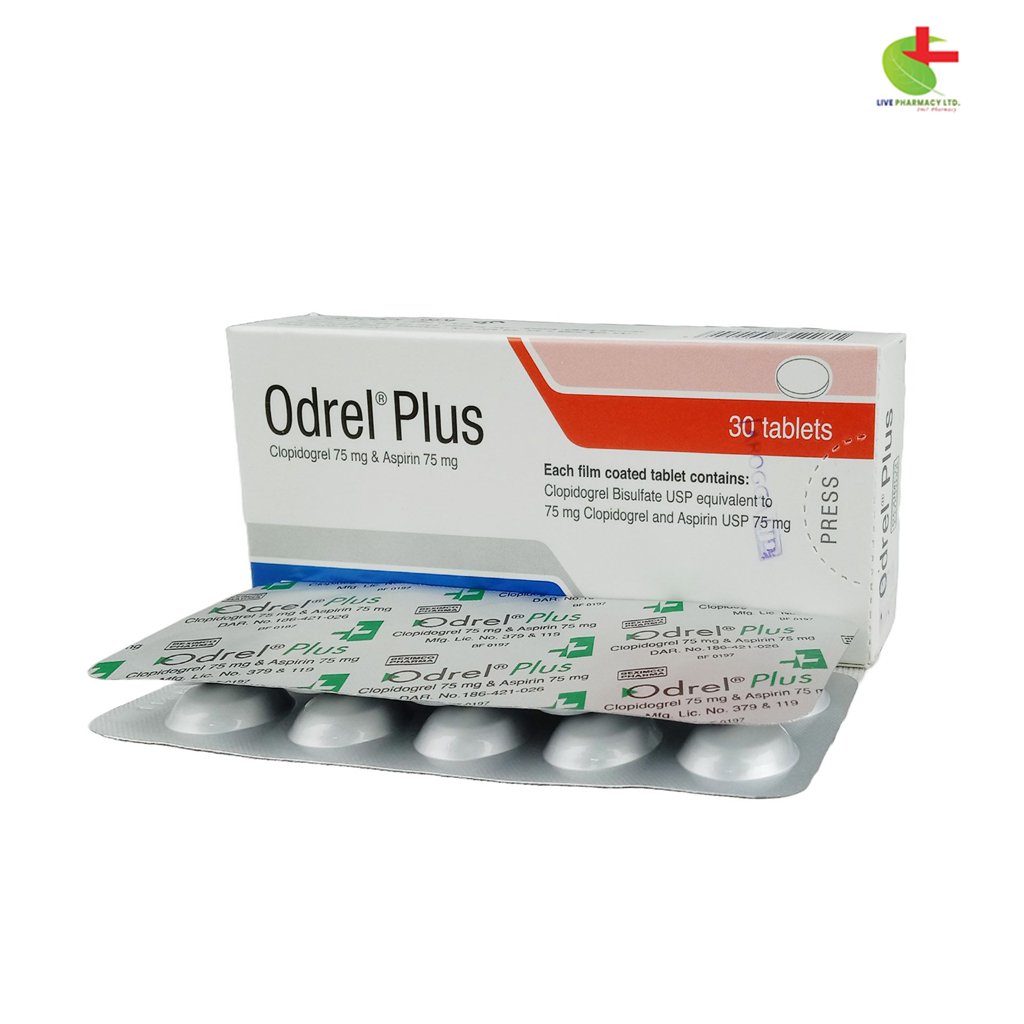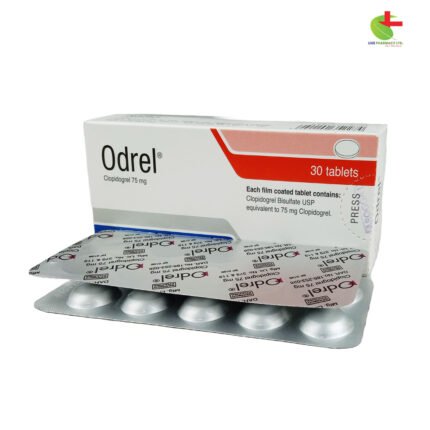Odrel Plus
120.00৳ Strip
- Reduces the risk of myocardial infarction (MI) and stroke in patients with acute coronary syndrome (ACS), recent MI, or established peripheral arterial disease.
- Combines Clopidogrel and Aspirin to inhibit platelet aggregation and improve cardiovascular outcomes.
- Recommended for daily use; administration should follow physician’s advice.
- Use with caution in patients with certain interactions or contraindications.
 Brand
Brand
|
Beximco Pharmaceuticals Ltd |
|---|---|
 Generics
Generics
|
Clopidogrel + Aspirin |
 Type
Type
|
Tablet |
0
People watching this product now!
Description
Indications:
- Acute Coronary Syndrome (ACS): Prescribed to lower the incidence of myocardial infarction (MI) and stroke in patients with non-ST-segment elevation ACS (unstable angina or non-ST-elevation myocardial infarction) and ST-segment elevation ACS (ST-elevation myocardial infarction).
- Recent MI, Stroke, or Peripheral Arterial Disease: Effective in reducing the risk of MI and stroke in individuals with a history of recent myocardial infarction, recent stroke, or established peripheral arterial disease.
Pharmacology:
- Clopidogrel: This prodrug inhibits platelet activation and aggregation through irreversible binding to the P2Y12 ADP receptors. Noticeable effects begin within 2 hours of administration, with steady-state inhibition achieved by Day 3 to Day 7.
- Aspirin: Works by irreversibly inhibiting platelet cyclooxygenase, preventing thromboxane A2 formation, which is crucial for platelet aggregation and vasoconstriction.
- Pharmacokinetics: Clopidogrel is rapidly absorbed, with peak plasma levels reached about 1 hour post-dose. It is extensively metabolized in the liver. The main metabolite, which does not affect platelet aggregation, constitutes approximately 85% of the drug-related compounds in plasma.
Dosage & Administration:
- Acute Coronary Syndrome: Begin treatment with a 300 mg loading dose of Clopidogrel, followed by a daily maintenance dose of 75 mg. Combination with Aspirin (75 mg-325 mg daily) is recommended.
- Recent MI, Stroke, or Peripheral Arterial Disease: Administer 75 mg of Clopidogrel daily, with or without food, without a loading dose.
Interactions:
- Increased Bleeding Risk: May occur when combined with NSAIDs, warfarin, SSRIs, or SNRIs.
- CYP2C19 Inhibitors: Avoid using with omeprazole or esomeprazole, as they may impair Clopidogrel’s effectiveness.
- Repaglinide: Concurrent use is not advised due to increased plasma levels.
Contraindications:
- Hypersensitivity: To Clopidogrel or any component of the product.
- Active Pathological Bleeding: Includes conditions like peptic ulcers or intracranial hemorrhage.
Side Effects:
- Common: Includes bleeding, gastrointestinal discomfort, diarrhea, and skin reactions.
- Rare: May involve acquired hemophilia, anemia, angioedema, and bone marrow disorders.
Pregnancy & Lactation:
- Pregnancy: Should be used only if clearly necessary during the first and second trimesters. Contraindicated in the third trimester.
- Lactation: Clopidogrel’s presence in breast milk is unknown; however, Aspirin is known to be excreted. Discontinue breastfeeding during treatment.
Precautions & Warnings:
- Bleeding Risk: Prolonged bleeding time is possible.
- Thrombotic Thrombocytopenic Purpura (TTP): Rarely reported; requires prompt treatment.
- Reye’s Syndrome: Risk in children with chickenpox or flu-like symptoms.
- Hypersensitivity: Includes rash, angioedema, or hematologic reactions.
Use in Special Populations:
- Children: Not recommended, especially under 12 years, due to the risk of Reye’s syndrome.
Overdose Effects:
- Clopidogrel Overdose: May cause bleeding complications; platelet transfusion might help.
- Aspirin Overdose: Symptoms include dizziness, headache, and gastrointestinal issues; severe cases may require hemodialysis.
Therapeutic Class:
- Anti-platelet drugs
Storage Conditions:
- Store below 30°C, in a cool, dry place, away from light and moisture. Keep out of reach of children.
Reviews (0)
Be the first to review “Odrel Plus” Cancel reply
About brand
Shipping & Delivery













Reviews
There are no reviews yet.